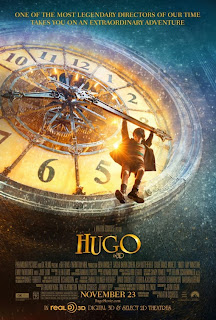Wednesday, December 07, 2011
In Theaters: Hugo
Hugo is the kind of movie I wish I saw more often. While Martin Scorsese doing a children's fantasy film in 3-D may not seem like the most obvious match, this kind of tribute to the history and power of the movies could only have been done justice by someone like him. An adaptation of Brian Selznick's acclaimed book "The Invention of Hugo Cabret" (which I have not yet read even though it is literally sitting next to me as I type this), Hugo is both a dazzling spectacle and a warm, intimate story about dreams and lives lost and reclaimed. It's one of my favorite films of the year.
Hugo Cabret (Asa Butterfield) is an orphan living in the catacombs of a Paris train station, working to maintain the clocks and on a mysterious automaton that his father found in a museum, and was trying to fix before he died. Nobody knows he's up there, so to live he's been stealing food and supplies from the shops, including a clockwork toy shop run by a stern old man (Ben Kingsley). The old man catches him and makes him work in the shop to pay off his debt, and there Hugo meets the man's granddaughter Isabelle (Chloë Moretz). The two become friends, and Hugo takes her to the movies for the first time, and then shows what he has been working on. It turns out Isabelle literally has the key that makes the automaton work, and the magnificent machine reveals a secret message from the past- one that, among other things, leads to the discovery that Isabelle's grandfather is the legendary filmmaker George Melies.
At first the brassy, blue-and-bronze images of the film seem familiar for the genre, but Hugo takes a lot of care to establish the right atmosphere. It's actually mostly red and blue, after the two-strip Technicolor process that was used sometimes during the silent era (and was employed for a similar effect in Scorsese's The Aviator) as well as being a fashionable combo of the time. The 3-D is used to highlight the enormity of the station as the world Hugo inhabits for most of his life, and is used in some excellent ways, bringing out the hidden picture-window depths of Melies' cinematic tableaus and making a comical station inspector (Sacha Baron Cohen) more sinister when he leans in to interrogate the boy. 3-D can be a restricting process, requiring brighter visuals and extreme care taken with the borders of the frame, but Scorsese navigates around them deftly, resulting in a film that feels light and unbound.
The story itself is surprising for just what it ends up being. While the first half has many of the hallmarks of a traditional children's fantasy, with an orphaned boy, a mystery from the past, persecution from authorities and the like, it unfolds to reveal something much more complex and human. Hugo wants to make the automaton work because he feels it may have a message for him from his father, but its true message leads him to someone else's story, and the gradual end of his isolation becomes bound up with learning to connect with the pasts and emotions of others. The screenplay, credited to John Logan, takes care to emphasize the basic decency of many of its characters, even the sinister/comical inspector, who is ashamed of the leg brace he must wear because of a war wound, and nurses a crush on a gentle flower girl (Emily Watson) in the best silent comedy tradition. There are no real villains, just the spectre of the Great War and a real world that often disappoints its dreamers.
As a loving homage to Melies and the silent era in general, the picture is a special treat for movie buffs. (It may not be coincidence that Brian Selznick is related to legendary movie producer David O. Selznick.) It's simply a treat to watch the flashbacks of Melies at work in his glass studio, with performers, props, and mechanical monsters all choreographed precisely. Film isn't the only medium given its due, though, as there are some lovely scenes with Christopher Lee as a kindly bookseller, and in the end it seems that booksellers, flower sellers, moviemakers, toy makers, and magicians all are part of the same group, seeking to make the world something greater through illusion. There are some great performances here, and both Butterfield and Moretz make strong impressions. (The latter is already well-known as a child actress but I'd missed most of her earlier work.)
It may not mean very much to describe a movie as magical, but that's the feeling that Hugo radiates. It dodges clichéd drama and phony sentiment in favor of the real thing, a loving salute to one of film's most influential legends. I don't often recommend movies "for the whole family" because I don't know most of you people, but this really is a great all-ages experience, one that I hope becomes a standard in years to come.
Based on the book "The Invention of Hugo Cabret" by Brian Selznick
Screenplay by John Logan
Directed by Martin Scorsese
Grade: A
Labels:
In Theaters,
Movies
Subscribe to:
Post Comments (Atom)

No comments:
Post a Comment